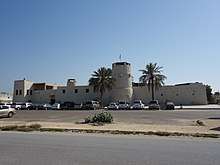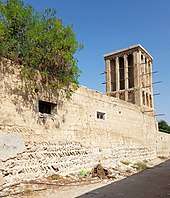Umm Al Quwain Fort
Umm Al Quwain Fort, also known as the Al Ali Fort, is located in the city of Umm Al Quwain in the United Arab Emirates (UAE). It was the seat of the rulers of Umm Al Quwain and the centre of government in the emirate until 1969. It was used as a police station before the fort was restored and opened to the public in 2000 by Sheikh Rashid Bin Ahmed Al Mualla, the Ruler of Umm Al Quwain at the time.

Today it houses the Umm Al Quwain National Museum.[1] Exhibits include artefacts from the important archeological site of Ed-Dur.
The Fort is located in the Madeena Al Qadeema or old souq area of Umm Al Quwain, the most traditional remaining area of the emirate's capital.[2]
History

The Al Ali Fort was built in 1768 by the founder of the modern Al Mualla dynasty, Sheikh Rashid Bin Majid Al Mualla.[3] Sheikh Hamad Bin Ibrahim Al Mualla was murdered in the fort in 1929 - shot and killed on 9 February 1929, by a slave called Saeed from the household of Hamad's blind uncle, Abdelrahman bin Ahmed Al Mualla.
Hamad was succeeded by Ahmad bin Rashid Al Mualla following a colourful incident whereby the population of the town rose up against Abdelrahman and Saeed, who had barricaded themselves in the fort. Abandoning their initial plan of firing on the fort with a cannon, the people of the town instead elected to set a fire around the walls of the fort and in this conflagration both Abrelrahman and Saeed were killed.[3] The British considered the whole affair to be highly suspicious and suspected Sultan bin Saqr Al Qasimi of Sharjah of involvement, but confirmed the young Ahmed as a Trucial Ruler nonetheless.[4]
Falaj Al Mualla Fort
A second fort in Umm Al Quwain, built in 1825, is to be found in the inland town of Falaj Al Mualla (previously known as Falaj Al Ali). Restored in a nine-year project, the fort opened to the public in 2015.[5]
References
- Reporter, Nasouh Nazzal, Staff (2008-11-02). "UAE museum: Umm Al Quwain Museum". GulfNews. Retrieved 2018-09-10.
- "In UAQ Old Town, past and present collide". The National. Retrieved 2018-09-10.
- "Umm Al Qawain Museums".
- Said., Zahlan, Rosemarie (2016). The Origins of the United Arab Emirates : a Political and Social History of the Trucial States. Taylor and Francis. p. 41. ISBN 9781317244653. OCLC 945874284.
- "Historic UAQ fort reopens for National Day". The National. Retrieved 2018-09-10.